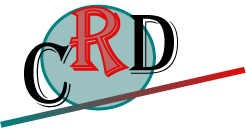Substantive Works
As I was not an academic librarian, I have not kept a detailed list of every speech and publication that I have made, typically five or six a year. Indeed, most are very routine matters, such as small columns in bar association newsletters or small speeches and panel participation at local library association meetings, that came with my office as a law library director, first at the University of Missouri–Kansas City School of Law, and then at the San Diego County Public Law Library. Here are some highlights from my publishing history. For a slightly longer list, consult my full curriculum vitae (Full CV) listed on the left navigation bar.
- “A Bibliographic Essay on Cognitive Linguistics for Law Librarians and Legal Researchers." (2008, updated 2010). A Lexis-Nexis Research Grant Project from the American Association of Law Libraries. For a PDF version (500 KB), click here.
- “The Queen of Chula Vista: Stories of Self-Represented Litigants and a Call for Using the Cognitive Theory of Linguistics to Work With Them,” Law Library Journal, vol. 99, issue 4, pages 717-756 (Fall 2007). An earlier version of this article was a winner in the Open Division of the American Association of Law Libraries Lexis-Nexis Call for Papers for 2006. For a citable PDF version (3.1 MB), click here.
- As chair of the Relocation Appeals Board for the City of San Diego, I presided over and wrote the opinion for the case of San Diego Refrigerated Services vs. Centre City Development Corporation (May 2003). This two-year case required seven day-long open meetings, huge amounts of documentation, and considerable research. Albeit only precedent for the City of San Diego, my opinion established the concept that “equitable relief” is not judged solely as “equal relief,” and that special circumstances can call for differing relief to different relocated parties. Much to the surprise of the City’s Centre City Development Corporation, the City Council accepted my opinion, and the parties subsequently settled. (This was the last of the seventeen litigated cases that occurred as a result of the creation of the San Diego Ballpark Redevelopment Zone. Petco Park opened April 8, 2004, two years later than scheduled.) Please contact me at charlesrdyer@clearwire.net if you have an interest in this Board opinion.
- I was editor of the For Your Information newsletter of the Council of California County Law Librarians for ten years (1988-1998), four times a year. The FYI reports a considerable amount of matters, including legislative, to the CCCLL membership. I transformed it from a photocopied information piece to a full scale, desktop published newsletter, with about 25 pages per issue. The newsletter is available at any California county law library. For a list of these, see http://www.cccll.org/ .
- I was the original author of the Recommendations portion of the report from the AALL Special Task Force on the Renaissance of Law Librarianship in the Information Age, Toward a Renaissance in Law Librarianship (American Association of Law Libraries, printed by West Group, 1996). The report was distributed to every member of the Association and was greatly influential on AALL strategic planning and subsequent task forces. The report is out of print, but a synopsis is available on the AALLNET website: http://www.aallnet.org/products/pub_renaissance.asp
- I was the chair for the Sourcebook for Law Library Governing Boards and Committees (AALL pub. #45, Rothman, 1994). Shirley David (Sacramento County Law Library), who worked with me on item 2, and I had presumed that we could take the Trustees Manual national with some ease, but that proved not to be the case, as the disparate types of law libraries and their governing boards required a complete re-write and expansion. I wrote about 70 percent of the original text. For this effort, I was singled out to receive the Connie Bolden Award from the State, Court and County Law Libraries Section of the American Association of Law Libraries, but I am mostly proud of coordinating the many contributions and the work of the committee.
- I was the reporter for the greatly expanded Council of California County Law Librarians’ Trustees Manual (3rd ed, 1992). It went from 10 pages to 306, and included a wealth of sample materials gathered from the members. I wrote about 60 percent of the original text, or approximately 50 pages, and organized the materials. A current version of this manual is now available in compact disc from the Council. You may contact them through their website at http://www.cccll.org/ .
- I was the local editor for the book, A Street Is Not a Home: Solving America’s Homeless Dilemma, by Judge Robert C. Coates (Prometheus, 1990). Essentially, we built the book on my computer, and I went over every word several times. The book was distributed by a foundation to over 9,000 state and local legislators and executive office holders. I administered the grant on behalf of the foundation.
- As the last editor of the Law Library Journal (1981-1984) when it was run on entirely volunteer staff, I upgraded the product by requiring cite checking of all citations, by creating a guide for authors that (with small revisions) is still being printed in each issue, by creating a guide for the preparation of bibliographies, and lastly by writing the proposal to the AALL Executive Board that enabled the next editor to hire copy-editing staff and to begin electronic submission of text to the printer.
 ]
]